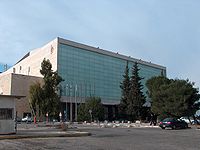History of the Eurovision Song Contest
This article needs additional citations for verification. (June 2011) |
The history of the Eurovision Song Contest began with the brainchild of Marcel Bezençon of the European Broadcasting Union (EBU). The contest was based on the Italian Sanremo Music Festival and was designed to test the limits of live television broadcast technology.
The first contest took place on 24 May 1956[1], where seven nations participated. As the Contest progressed, the rules grew increasingly complex and participation levels rose to pass forty nations at the end of the 20th Century. As more countries came on board over subsequent decades and technology advanced, the EBU attempted to keep up with national and international trends.
The end of the Cold War in the early 1990s led to a sudden increase in numbers, with many former Eastern Bloc countries queuing up to compete for the first time. This process continued into the 2005 contest, in which both Bulgaria and Moldova made their debut.
Liechtenstein and Vatican City are the only European countries not to have participated; the last major European country to take part was the Czech Republic which made its debut in the 2007 contest. San Marino took part in the 2008 Eurovision Song Contest in Belgrade, Serbia, together with Azerbaijan.
Competition history

 London. Royal Albert Hall, venue of 1968 contest.
London. Royal Albert Hall, venue of 1968 contest.
 Jerusalem. International Convention Centre, venue of 1979 and 1999 contests.
Jerusalem. International Convention Centre, venue of 1979 and 1999 contests.
 Malmö. Malmö Entertainment Centre, venue of 1992 contest.
Malmö. Malmö Entertainment Centre, venue of 1992 contest.
 Oslo. Oslo Spektrum, venue of 1996 contest.
Oslo. Oslo Spektrum, venue of 1996 contest.
 Stockholm. Globen Arena, venue of 2000 contest.
Stockholm. Globen Arena, venue of 2000 contest. Istanbul. Abdi İpekçi Arena, venue of 2004 contest.
Istanbul. Abdi İpekçi Arena, venue of 2004 contest.
 Belgrade. Belgrade Arena, venue of 2008 contest.
Belgrade. Belgrade Arena, venue of 2008 contest.The songs
The earliest period in the Eurovision history is marked by the style of songs which participated and the manner in which the show itself was presented. Famous musical and film stars would participate without prejudice, with Italian winners of the Sanremo Festival and such British names as Patricia Bredin and Bryan Johnson. With a live orchestra the norm in the early years, and simple sing-a-long songs on every radio station, the Contest grew into a favourite amongst almost all age groups across the continent. Iconic songs such as Volare and Serge Gainsbourg's Poupée de cire, poupée de son hit the sales charts in many countries after their Eurovision performance.
In the beginning, it was obvious for the participants that they should sing in their country's national language. However, as the Swedish entry in 1965, "Absent Friend" was sung in English, the EBU set very strict rules on the language in which the songs could be performed. National languages had to be used in all lyrics, with even the obscure Maltese insisted upon when the island nation made its debut. Song writers across Europe soon tagged onto the notion that success would only come if the judges could understand the content, resulting in such entries as Boom-Bang-A-Bang and La La La. The lyrics were allowed to contain occasional phrases in other languages, which was utilized for example by the Yugoslavian song in 1969. In 1973, the rules on language use was relaxed, and in the following year ABBA would win with Waterloo.
Those "freedom of language" rules would be soon reversed in 1977, to return with apparent permanent status in the 1999 contest, with the intervening years waning from highlights to dead-weight years. The "swinging sixties" and punk scenes were all but missed by the contemporary Eurovision periods, whilst the 1980s saw an increase in balladry with an almost blanket disregard for electronica or guitar-based pop. Other than heavily infused pop versions, rap has been next to completely ignored.
One result of the attempt to modernise the songs in the Contest was the abolition of the obligatory use of the live orchestra, to which all songs had to perform. This decision was made in 1997 and removed the automatic requirement for songs to be re-composed for playback with a live orchestra. As of 1999, the host country hasn't been obliged to provide a live orchestra, and there hasn't been one since. No attempt has been made to return the Contest to the days of live bands and violins. In fact all instruments must be mimed by reglement, live music is not allowed. This rule most likely exists because there isn't enough time to wire the instruments during the short break between the songs. On the other hand a backing tape may have no voices on it, singing still must be done live. Before 1997 backing tracks were allowed, but only if all instruments on tape were featured on stage. This explains the odd situation in 1996, when Gina G, entrant for the United Kingdom, had two computer screens on stage.
Other than the earliest contests, each and every entry has been fixed at a maximum three minutes in length.
The measuring the success of the modern day Eurovision in keeping up with modern trends has been difficult to determine. The Ukrainian winner's (Ruslana) Wild Dances won with national motives and wild song, but the Estonian hit Everybody was something of an outdated upbeat pop song.
Competitors
Performers to have graced the Eurovision stage include:
See also
References
- ^ "Eurovision - History". Eurovision. Retrieved June 08, 2011.
{{cite web}}: Check date values in:|accessdate=(help)
External links
- History by Year
- Eurovision Song Contest: The Story
- Sing Your Heart Out, Europe: The Eurovision Song Contest
